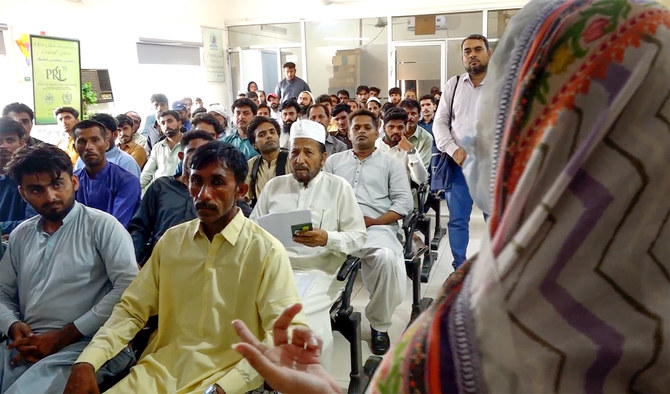KARACHI: A Pakistani government official said on Wednesday that the country aimed to increase its manpower exports to one million per annum, as job opportunities worldwide improve with the disastrous effects of the coronavirus pandemic fading, and many Pakistanis looking to flee the prevailing economic crisis at home.
Grappling with an economic meltdown that has led to surging inflation and a balance of payments crisis, Pakistan exported 0.83 million human resources in 2022 mainly to Saudi Arabia and the United Arab Emirates (UAE).
The Gulf market is a traditional one that absorbed around 77% of Pakistan’s skilled labor force, with the South Asian country exporting over 12.7 million people to about 50 countries since 1971, official data shows.
“During the COVID-19 period, the overall Pakistani export of manpower suffered a lot and most international companies disengaged their workers,” Abdul Shakoor Soomro, deputy director protectorate of the emigrant at Bureau of Emigration & Overseas Employment (BEOE), told Arab News last week.
Pakistani officials are confident the country can export up to one million workers per year provided the labor market improves further and the effects of the coronavirus pandemic continue to erode.
“In 2015 we almost reached the one million mark and after the COVID-19 (normalization) we are restoring [these numbers] at the same pace," Soomro said.
Soomro said the manpower exports facilitated by the BEOE in 2023 have reached 372,000 people as companies start rehiring employees.
“The employment ratio is increasing as companies have started rehiring workers that were impacted by COVID-19,” Soomro said, adding that since there is surplus manpower in Pakistan and prevailing unemployment, people are anxious to get jobs in the country or abroad.
The BEOE official said most Pakistani laborers are seeking jobs in the Gulf countries and “almost 80% to 85% people are going to Saudi Arabia, UAE and other Gulf region countries.”
In 2022 alone, 17,976 highly qualified and 20,865 highly skilled Pakistanis left their country for better opportunities abroad, the BEOE data states.
“Doctors, engineers and the skilled, semi-skilled [laborers], all type of people are going abroad for a bright future," Adnan Paracha, an emigration expert and overseas employment promotor told Arab News. "In 2022, almost 2,300 to 2,400 doctors and almost 5,500 engineers went abroad.”
Paracha said foreign companies seeking Pakistani professionals was a positive development as it would increase remittances to the country. “Normally, doctors in Pakistan draw Rs80,000 to Rs90,000 salary ($278-319) and if they go abroad, they can get Rs600,000 ($2,092) to Rs700,000 ($2,441).”
Economists said the outflow of skilled professionals from Pakistan, often referred to as “brain drain,” is mainly due to lack of industrial activities and job opportunities in the South Asian country.
“People are leaving Pakistan because they don’t get good employment,” Ammar Habib Khan, a research economist, told Arab News.
“Our industry has not developed and the professionals we produce go abroad and send remittances but without the development of local industry, how long would we depend on remittances," he said.
Khan said for the past 10 years, Pakistan's dependence on remittances has been increasing as compared to exports.
Paracha agreed, saying that not utilizing professionals and skilled laborers is a "drawback" for the government.
However, Soomro disagreed with both, saying that this is not brain drain but a "normal foreign employment process.”
Pakistani professionals, on the other hand, say they are going abroad for better training opportunities and higher salaries.
“There are training facilities in Pakistan but because it is the UK, we will get a better learning opportunity and will be able to serve people after coming back,” Dr Ankash Kumar, a 26-year-old from Sindh’s remote Tharparkar district, told Arab News.
Another professional, Sufyan Rasheed, said he received a better salary offer from an IT company in Dubai hence he opted to move abroad.
“I was working as accountant here but found a better opportunity there and I am going to join the company as account manager," he added.
Overseas employment promotors said European countries, Japan, and Korea apart from the Gulf countries, are looking for IT specialists in addition to doctors and engineers from Pakistan.
Pakistan can increase its manpower exports through proper training, which should include learning languages for Germany, Poland, Romania, and England, Paracha said.












